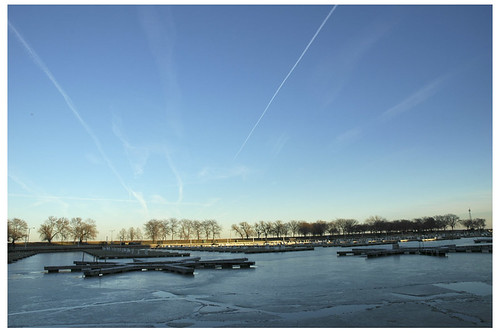
[click to embiggen Ice Satellites of Love]
Water wars are going to replace oil wars in the future. Geopolitics isn't dead. There are other methods of getting water, but they aren't polite.
Piece by piece, a 5,500-mile wall around the Great Lakes is going up. You can't see it, but construction is progressing nicely, along with an implied neon sign that flashes, "Hands off—it's our water."
The legal pilings for a 1,000-mile segment of the wall are scheduled to be sunk Tuesday when Wisconsin Gov. Jim Doyle finalizes his state's approval of the so-called Great Lakes Compact, a multistate agreement designed to protect and restrict access to nearly 20 percent of the world's supply of fresh water, contained in the five Great Lakes.
After that will come Ohio, where later this week the legislature is expected to make it the sixth state to endorse the water agreement and advance a strong regional warning to chronically dry regions of the South and West that Great Lakes water is staying here."The Great Lakes are our Grand Canyon. It's our resource to protect, it's the backbone of the region," said Joel Brammeier, vice president for policy at the Alliance for the Great Lakes.
[From Midwest's message: Hands off our lakes -- -- chicagotribune.com]
The real threat, if there is one, is corporate water resellers swooping in and bottling water for sale. Another threat is from communities just outside the Great Lakes Basin who have expanded beyond the capabilities of their region:
Robert Glennon, professor of law and public policy at the University of Arizona, said the threat of piping water to the Southwest "has always been wildly exaggerated."
"The realistic fear for the Great Lakes comes from within the region," Glennon said, pointing to communities with polluted drinking water, such as the western Milwaukee suburbs of New Berlin and Waukesha, which have a clear interest in the water compact being approved.
"We're kind of the poster child of Wisconsin," quipped Jack Chiovatero, mayor of New Berlin.
Here's why: New Berlin straddles the Great Lakes Basin, with about one-third of its 38,000 residents receiving water from Lake Michigan, and the remainder getting drinking water from wells contaminated with radium. The Environmental Protection Agency has ordered the city to either clean up or find a safer source of water. Either solution is expensive.
Water rights in New Berlin are pretty much divided by Sunny Slope Road. If you live on the east side, you get Lake Michigan water, and whatever you use is eventually returned—after treatment—to the lake. If you're on the west side, you don't get lake water because without a means to return it, it works its way toward the Mississippi River. This is a situation the water compact is intended to prevent — draining the Great Lakes of water that will never be returned.
"If you have a thousand straws sipping into the lake," Brammeier said of communities outside the basin, "we don't want to go there because that could have an impact."
